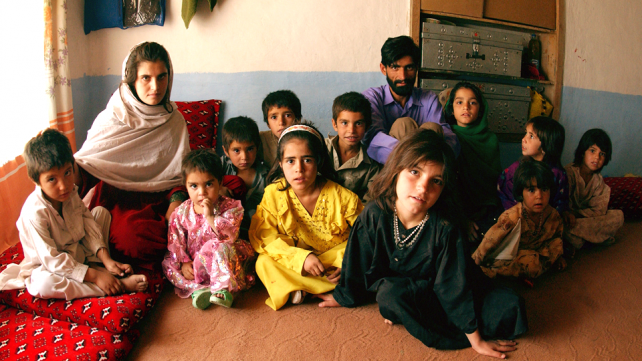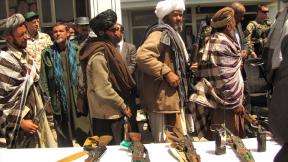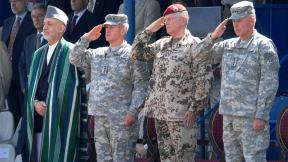
According to the CIA World Factbook, an Afghan's life expectancy is merely 45 years.
That's 20 to 30 years less than neighboring Pakistan and all other surrounding countries. It is just one result of the ongoing devastation in that country.
The war in Afghanistan did not start in 2001 with the US invasion. It began 30 years ago in December 1979, when the former Soviet Union invaded the country. The human toll of the conflict is staggering: more than a million Afghans have been killed and 3 million maimed.
Five million (one third of the pre-war population) were forced to leave their country and became refugees. There are still 3.1 million Afghan refugees today, making up 27 percent of the global refugee population. Most of them live in Pakistan. Another two million Afghans were displaced within the country. In the 1980s, one out of two refugees in the world was an Afghan.
Most Afghans alive today have seen nothing but war.
Daily life in Afghanistan is miserable. Only six percent have electricity in a country which gets as cold as Chicago in winter. Even in Kabul, the country's capital, electricity comes for only a few hours a day. Traditional wood heating is difficult since not much wood is left in Afghanistan after 30 years of wars and forest devastation. Over 1,000 people died because of cold weather last year.
"About two million state school students do not have access to safe drinking water and about 75 percent of these schools in Afghanistan do not have safe sanitation facilities," according to the UN Children's Fund (UNICEF).
There is no law and order in most of Afghanistan. Government barely exists in Kabul. Former warlords are the leaders. That is demonstrated by the fact that "Afghanistan is the world's largest cultivator and supplier of opium (93 percent of the global opiates market)." A British daily paper actually reported that "the four largest players in the heroin business are all senior members of the Afghan government."
The Taliban, which has lost its legitimacy due to its brutality, are sometimes remembered by Afghans as those who brought peace to Afghanistan.
Women continue to be the number one victims of the country's 30 years of warfare. According to Malalai Joya, an elected member of the Afghan Parliament and outspoken critic of warlords and war criminals in the government, "the propaganda to the world about liberating Afghanistan and women and fighting against terrorists are lies." In her speech accepting a human rights award in London, she said:
Our nation is still living under the shadow of war, crimes and brutalities of the fundamentalists, and women are the primary and silent sacrifice of this situation. Justice doesn't exist in Afghanistan. Every sector of life in Afghanistan today is a tragedy, from women's rights to security, law and order and domination of a drug mafia.
Almost two generations of Afghan children have grown up seeing nothing but war, bombing, homelessness and hunger. They are an easy target for those who want to play Afghans against each other, through money, drugs and guns.
Afghanistan was almost self-sufficient in food before the Soviet invasion in 1979. The leftist government had instituted many economic and social reforms. But the Soviets went in for the bait set up by the US to take revenge for the Vietnam War, as bragged about by Zbigniew Brzezinski, former US President Jimmy Carter's National Security Advisor. That was the beginning of the Afghan tragedy 30 years ago. Since then, the country has not seen a day of peace except for the brief brutal peace of Taliban era.
America trained, financed and equipped Afghan refugees to become Mujahideen to kill the Communist Soviets. Along the way, we created a cadre of fighters, including Osama bin Laden. Then, we supported and financed the Taliban and now we are trying to kill them as well.
In ten years of U.S. occupation of Afghanistan, the government of Hamid Karzai and American influence have remained limited to Kabul and a few other smaller areas. Now it is not just the Americans, NATO and Pakistan which are playing their cards, but India, Russia and Iran also have increased embassy staff and active participation in carving a realm of power in Afghanistan.
If the British Empire in the 19th century could not succeed in occupying Afghanistan despite close to a century of war on and off, and the Soviets failed to do the same during the twentieth century, we cannot win either. Isn't it about time that we Americans in the 21st century rethink the "good war" in Afghanistan? After ten years of going nowhere, it is surely time for a new strategy.
Consider this: if the Soviets, with 120,000 troops at any given time (500,000 total) could not do it, how can the US with a little over 100,000?
And the Soviet Union was just across the border from Afghanistan, not tens of thousands of miles away as America is.
In Iraq which is half of the size of Afghanistan, the U.S. had more than 150,000 troops plus 190,000 contractors, killing one million people and destroying the whole infrastructure of the country.
Afghanistan has 16 percent more people than Iraq. It has a far more challenging military environment because two-thirds of Afghanistan is mountainous terrain suitable for guerrilla warfare unlike the flat plains of Iraq.
Most Afghans have been raised accustomed to war and hardship during the last three decades, unlike the comparatively more urbanized Iraqis.
President Obama has been dangerously wrong for pursuing the military path in Afghanistan. It is one that will only exacerbate terrorism, as well as further destroy a nation crippled by thirty years of war. It will lead to the deaths of more American soldiers. And I have no doubt that it will further lower the life expectancy of Afghans, those who continue to suffer the most.
American people, Afghans, and Pakistanis, all are against this war. It’s about time that their leaders listen to their people.








Add new comment